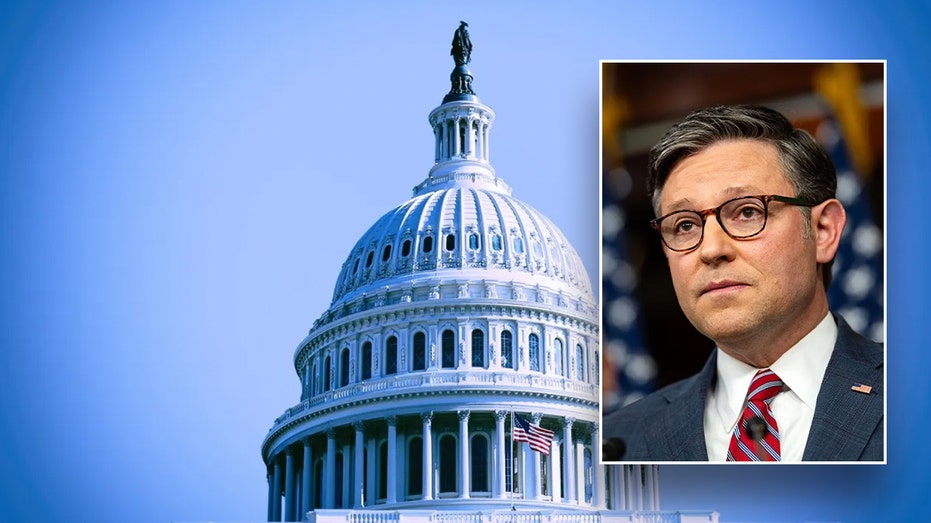The House has passed a bill to avert a partial government shutdown on Friday, hours before the midnight federal funding deadline.
The bill, which needed approval from two-thirds of the chamber, passed overwhelmingly in a 366 to 34 vote.
All Democrats voted for the bill save for Rep. Jasmine Crockett, D-Texas, who voted “present.”
Lawmakers were scrambling for a path forward after an initial bill was tanked by President-elect Trump and his allies on Wednesday, and a later bill approved by Trump failed on the House floor Thursday.
DANIEL PENNY TO BE TAPPED FOR CONGRESSIONAL GOLD MEDAL BY HOUSE GOP LAWMAKER
But Trump has stayed noticeably silent on this latest measure – which many House Republicans saw as a tacit sign of approval.
Speaker Mike Johnson, R-La., was optimistic after days of uncertainty, telling reporters there would be a House-wide vote Friday when leaving a closed-door House GOP meeting where leaders presented their plan.
“We will not have a government shutdown, and we will meet our obligations for our farmers who need aid, for the disaster victims all over the country and for making sure that military and essential services and everyone who relies upon the federal government for a paycheck is paid over the holidays,” Johnson said.
Meanwhile, the national debt has climbed past $36 trillion, and the deficit is over $1.8 trillion.
The legislation, if passed in the Senate, would extend current government funding levels through mid-March, a measure known as a continuing resolution (CR), paired with just over $100 billion in disaster relief aid for victims of storms Helene and Milton, as well as assistance for the agriculture industry.
Johnson bypassed regular House procedures to get the legislation straight to a chamber-wide vote, a maneuver known as “suspension of the rules.”
In exchange for the fast track, however, the threshold for passage was raised from a simple majority to two-thirds of the House chamber, meaning Democratic support is critical.
MIKE JOHNSON WINS REPUBLICAN SUPPORT TO BE HOUSE SPEAKER AGAIN
Rep. Thomas Massie, R-Ky., told reporters he believed Johnson struck an agreement with House Minority Leader Hakeem Jeffries, D-N.Y. A longtime Johnson critic, Massie said he would not vote for the bill.
“Trump wanted a debt limit increase, and now we’re bringing the exact same bill to the floor without the debt limit increase,” Massie said.
Another Republican lawmaker argued Johnson would not move forward without Trump’s blessing.
“We wouldn’t do it if they weren’t,” Rep. Dan Meuser, R-Pa., said when asked if Trump and Elon Musk were supportive of the deal.
Trump and Musk led the conservative rebellion against the initial plan to avert a partial shutdown, a bipartisan deal that came from negotiations between the top two Democrats and Republicans in both Congressional chambers.
That bill, 1,547 pages, would have extended current government funding levels until March 14. However, GOP hardliners were angered by what they saw as unrelated measures attached to the bill, like a pay raise for congressional lawmakers, health care policy provisions and legislation aimed at revitalizing RFK Stadium in Washington, D.C.
TRUMP-BACKED SPENDING BILL GOES DOWN IN FLAMES AS SHUTDOWN LOOMS
It was scrapped as Trump and Musk threatened to force out of office any lawmaker who did not support pairing a CR with action on the debt limit.
The debt limit is suspended until January 2025 through a prior bipartisan deal, but Trump had pushed for Republicans to act on it now to avoid a messy, protracted fight early in his term.
The second iteration of the funding deal was much slimmer, coming in at 116 pages. It excluded the stadium bill and the congressional pay raise, but still included measures to fund the rebuilding of Baltimore’s Francis Scott Key Bridge and disaster aid funding. It also suspended the debt limit through January 2027.
A House vote on the second plan went down in flames, however, after 38 Republicans opposed to raising or suspending the debt limit voted with all but two Democrats to defeat the bill.
Johnson huddled with those holdouts Friday morning, along with Trump’s nominee to lead the Office of Management and Budget, Russell Vought, and Vice President-elect JD Vance.
The bill that passed the House on Friday does not act on the debt limit, but Johnson pledged in that closed-door meeting to raise the debt limit early next year as part of Republicans’ plans for a massive policy and spending overhaul.
During their closed-door meeting Friday, House GOP leaders unveiled their CR plan as well as a plan to raise the debt limit by $1.5 trillion, followed by $2.5 trillion in net spending cuts, multiple people told Fox News Digital.
Democrats who left their own closed-door meeting shortly before the vote largely said they would support the bill – which they did.
President Biden has said he would sign it into law if it reaches his desk after a Senate vote.



